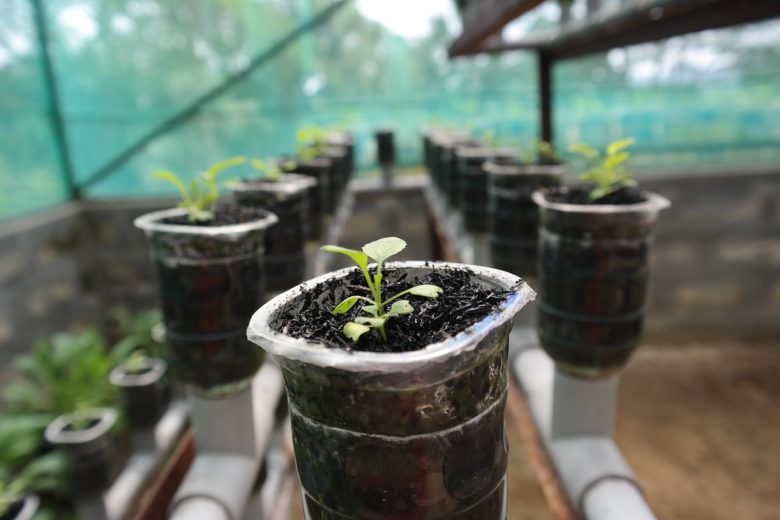
10 Environmental Benefits of Hydroponics
We are reader-supported. When you buy through links on our site, we may earn affiliate commission.
Did you know there’s more than one way to grow plants? The traditional agriculture method calls for soil, water and sun — but it’s possible to cultivate a garden without that first component. A hydroponic crop doesn’t use land to supply plants with their nutrients. Instead, it feeds them with nutrient-enriched water through their roots. As a result, it’s more sustainable than popular conventional techniques. Here are 10 environmental benefits of hydroponics.
1. Supplies All Nutrients
When you use soil to grow plants, it’s almost always harder for them to fully receive each nutrient. That’s because most dirt retains a few nutrients for itself. Many plants can thrive when planted with soil — but you won’t be able to cultivate big, beautiful crops like you see with hydroponics. When plants have direct access to nutrients, it’s far easier for them to thrive.
2. Uses Less Acreage
A hydroponic garden doesn’t require as much land as other alternatives. Because this practice forgoes soil, it’s easier to allocate space creatively. You aren’t committed to a single outdoor field with limited room. Plants can grow closer together when you try hydroponics, too. In fact, commercial hydroponic farms use far less land than traditional crops.
This advantage creates more space for wildlife and vegetation to prosper. Excessive land use often leads to ecosystem devastation.
3. Saves More Water
Conventional farms rely on extensive water use to care for their crops. That’s because they have much more land to cover — but it’s also due to unsustainable methods that don’t work for traditional plant growth. They may even waste water through runoff caused by surface irrigation. While some organic farms may have better ways to deal with their liquid, it’s mostly impossible to limit use for such large fields.
Hydroponics requires much less water than traditional agriculture methods. This practice captures and recycles water so every ounce has a purpose. As a result, it’s easier for farmers to reduce their footprint.
4. Requires Little Fertilizer
Many farmers and gardeners like to use fertilizer to enhance plant growth. The nutrient-enriched water that hydroponic plants consume doesn’t require additional help. Therefore, you won’t need to incorporate extra elements into your crops. They’ll grow perfectly without a need for either chemical or organic fertilizers. Those products often have adverse environmental effects — especially when you look at runoff implications.
5. Grows Crops Year-Round
A hydroponic crop doesn’t typically grow outdoors. Plants rely on nutrient-dense water as well as overhead lights to promote growth. They don’t require any outside elements that traditional agriculture uses to grow healthy crops. Farmers can enjoy year-round produce as a result, which allows them to enjoy consistent work and profit. They won’t have to bother with replowing or replanting.
The environmental benefits of hydroponics make it so you don’t have to consistently damage soil to grow produce.
6. Reduces Fossil Fuels
Our current agriculture process uses excessive fossil fuels. We can attribute 10% to greenhouse gas output across America. Because hydroponics relies on less land and water, it’s a surefire way to reduce those productions. When farms use various materials and supplies to raise both animals and crops, it’s harder on the environment. A hydroponic alternative allows for a more eco-friendly process.
7. Eliminates Soil Erosion
Many growers unknowingly contribute to detrimental soil erosion when they farm. There’s only so much land for people to use worldwide. Because there’s a limit, it’s become more popular for people to cut down natural resources so they can farm. When you regularly till and plant, it eventually becomes impossible to reuse that land. However, you won’t contribute to this problem if you have hydroponic crops.
8. Creates Local Foods
Those who grow hydroponics create local food opportunities. When people usually buy their groceries from a supermarket, it’s often difficult to predict how far they traveled. If you buy from local businesses and farms instead, you’ll help the planet. A hydroponic farm can be a practical resource.
9. Provides More Plants
A hydroponic garden can provide larger plant yields than traditional crops. When you place crops closer together, it’s easier to fit more into a space. As a result, you’ll be able to harvest more fruits and vegetables. Creating more productive farms through sustainable initiatives is a climate-smart agriculture goal. That’s why hydroponics has become a key method for those who want to grow eco-friendly produce.
10. Eliminates All Pesticides
You don’t have to bother with pesticides if you choose hydroponics. A conventional farm or garden likely uses chemicals to eradicate bugs and weeds that may impact growth. If you create an indoor hydroponic garden with stacked shelves, you won’t have to deal with any pests. Pesticides can lead to various health implications when these plants are eaten.
Environmental Benefits of Hydroponics Span Far and Wide
A hydroponic crop cuts down on significant issues associated with unsustainability. It’s a far better option for farmers who want to grow plants without negative environmental impact. All growers can enjoy the benefits of hydroponics.
Share on
Like what you read? Join other Environment.co readers!
Get the latest updates on our planet by subscribing to the Environment.co newsletter!
About the author

Jane Marsh
Starting from an early age, Jane Marsh loved all animals and became a budding environmentalist. Now, Jane works as the Editor-in-Chief of Environment.co where she covers topics related to climate policy, renewable energy, the food industry, and more.





